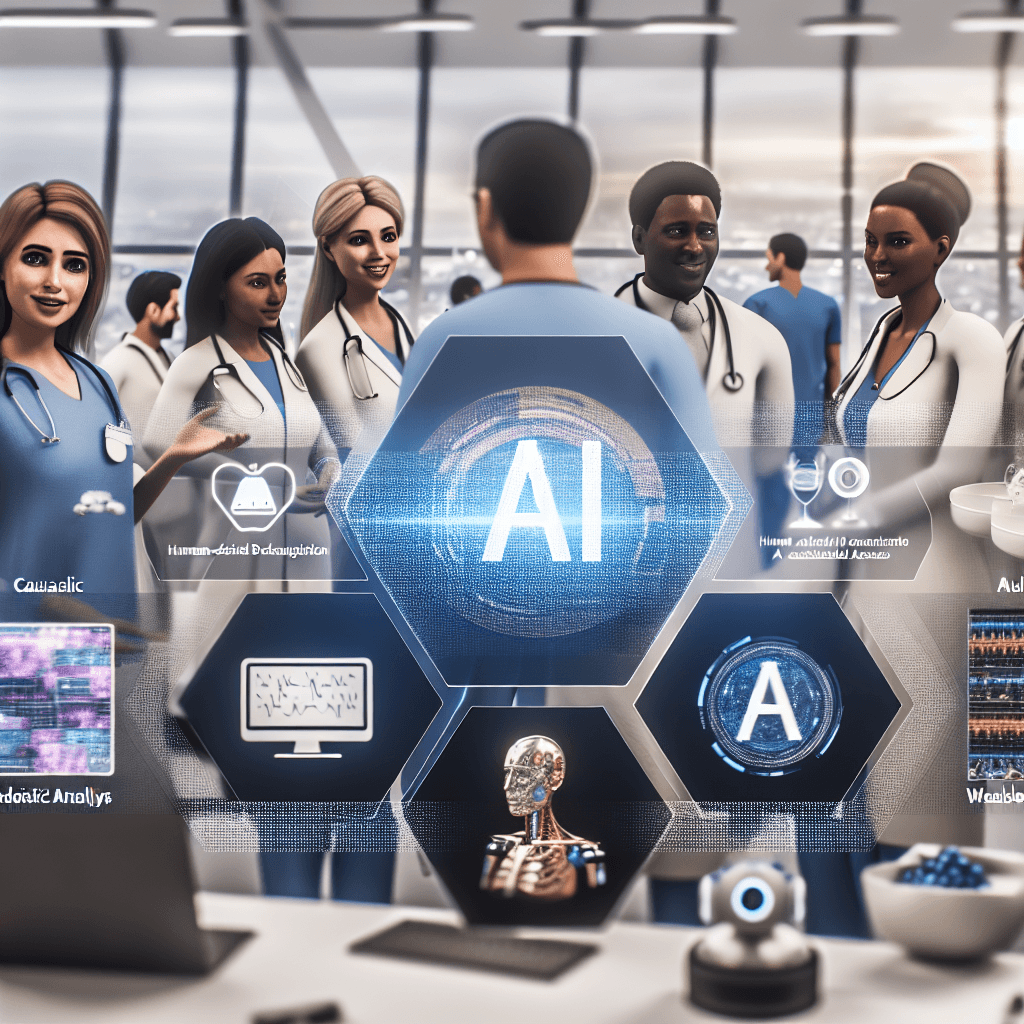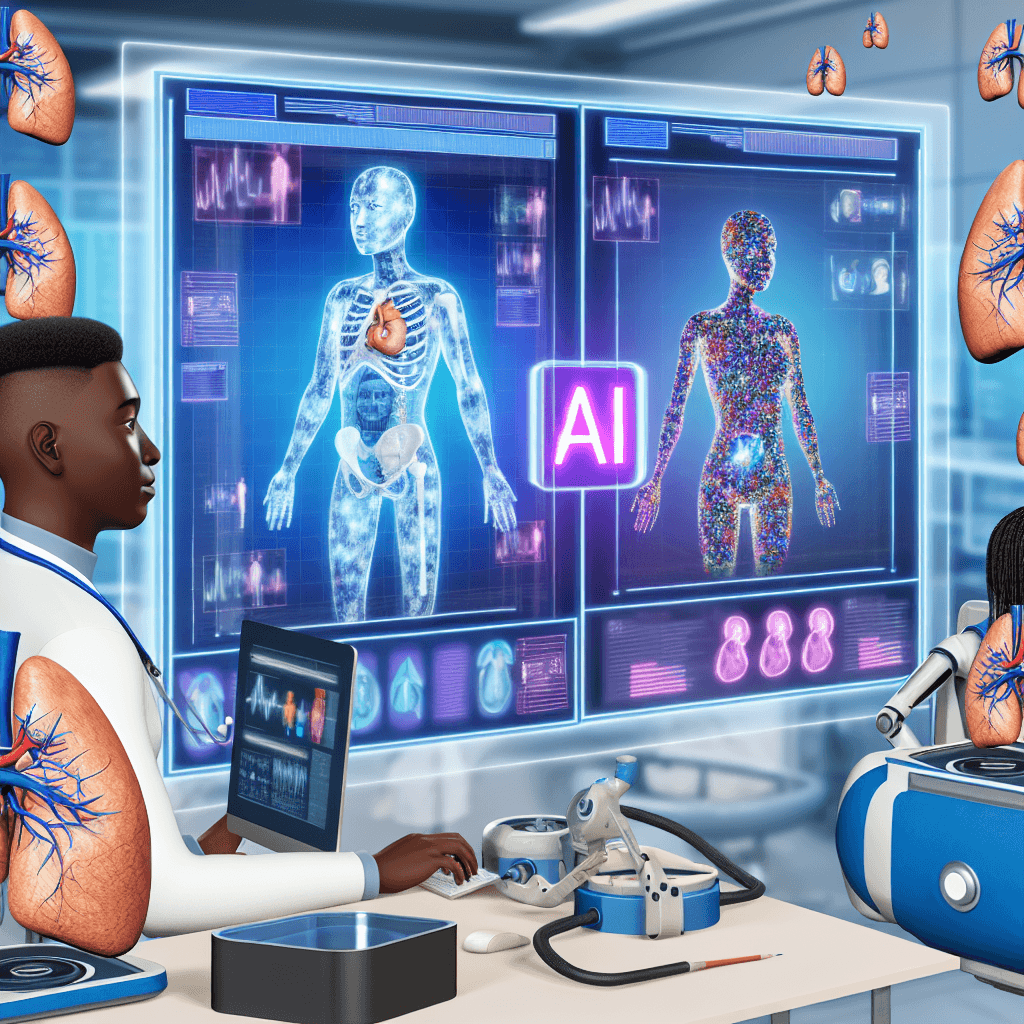Discover how AI is revolutionizing healthcare IT, from improving patient care to streamlining administrative tasks. Stay ahead of the curve.
The Role of AI in Driving Healthcare IT Advancements

Table of Contents
“Revolutionizing healthcare through the power of AI: Empowering precision, efficiency, and innovation.”
Introduction
Artificial intelligence (AI) has become a major driving force in the advancement of healthcare information technology (IT). With its ability to analyze vast amounts of data and make predictions, AI has the potential to revolutionize the way healthcare is delivered and managed. From improving diagnostic accuracy to streamlining administrative tasks, the role of AI in healthcare IT is rapidly expanding and transforming the industry. In this essay, we will explore the various ways in which AI is being utilized in healthcare and the potential impact it can have on the future of healthcare delivery.
The Impact of AI on Medical Diagnostics and Treatment Planning
Artificial intelligence (AI) has been making waves in various industries, and healthcare is no exception. With its ability to analyze vast amounts of data and make predictions, AI has the potential to revolutionize the way medical diagnostics and treatment planning are conducted. In this article, we will explore the impact of AI on these crucial aspects of healthcare and how it is driving IT advancements in the field.
One of the most significant benefits of AI in healthcare is its ability to assist in medical diagnostics. Traditional diagnostic methods rely heavily on the expertise of healthcare professionals, which can be limited by human error and subjectivity. AI, on the other hand, can analyze vast amounts of data from various sources, including medical records, lab results, and imaging scans, to provide accurate and timely diagnoses.
Moreover, AI can also help in identifying patterns and trends that may not be apparent to human eyes. This can be especially useful in detecting rare diseases or conditions that may have similar symptoms to more common ones. By analyzing data from a large pool of patients, AI can identify patterns that can aid in early detection and treatment of these conditions.
In addition to diagnostics, AI is also playing a crucial role in treatment planning. With its ability to analyze data and make predictions, AI can assist healthcare professionals in developing personalized treatment plans for patients. This is particularly beneficial in complex cases where multiple factors need to be considered, such as a patient’s medical history, genetic makeup, and lifestyle choices.
AI can also help in predicting the effectiveness of different treatment options for a particular patient. By analyzing data from similar cases, AI can provide insights into which treatment plan is likely to yield the best results for a patient. This can save time and resources by avoiding trial and error methods and providing more targeted and effective treatment.
Another area where AI is making a significant impact is in medical imaging. With the advancement of technology, medical imaging has become an essential tool in diagnosing and treating various conditions. However, analyzing and interpreting these images can be time-consuming and prone to human error. AI can assist in this process by analyzing images and identifying abnormalities that may be missed by the human eye. This can aid in early detection and treatment of conditions such as cancer, where early diagnosis is crucial for better outcomes.
Moreover, AI can also help in reducing the workload of healthcare professionals by automating routine tasks such as image analysis. This can free up their time to focus on more critical tasks, such as patient care and treatment planning.
The use of AI in healthcare is not without its challenges. One of the main concerns is the potential for bias in AI algorithms. If the data used to train these algorithms is biased, it can lead to inaccurate predictions and decisions. To address this issue, it is crucial to ensure that the data used to train AI algorithms is diverse and representative of the population.
Another challenge is the integration of AI into existing healthcare systems. As with any new technology, there may be resistance to change and a learning curve for healthcare professionals. It is essential to provide proper training and support to ensure the successful implementation of AI in healthcare.
In conclusion, AI is playing a significant role in driving healthcare IT advancements, particularly in medical diagnostics and treatment planning. Its ability to analyze vast amounts of data and make predictions is revolutionizing the way healthcare professionals diagnose and treat patients. However, it is crucial to address the challenges and concerns surrounding the use of AI in healthcare to ensure its successful integration and maximize its potential for improving patient outcomes.
How AI is Revolutionizing Electronic Health Records and Data Management

The healthcare industry has always been at the forefront of technological advancements, constantly seeking ways to improve patient care and outcomes. In recent years, the integration of artificial intelligence (AI) has revolutionized the way healthcare providers manage electronic health records (EHRs) and handle data. AI has the potential to transform the healthcare landscape, making processes more efficient, accurate, and personalized.
One of the key areas where AI is making a significant impact is in the management of EHRs. EHRs are digital versions of a patient’s medical history, including diagnoses, medications, lab results, and treatment plans. They serve as a central repository of patient information, allowing healthcare providers to access and share data easily. However, the sheer volume of data contained in EHRs can be overwhelming for healthcare professionals to manage, leading to potential errors and delays in patient care.
This is where AI comes in. With its ability to analyze vast amounts of data quickly and accurately, AI can assist healthcare providers in managing EHRs more efficiently. For instance, AI-powered algorithms can scan through a patient’s medical history and flag any potential drug interactions or allergies, alerting healthcare providers to potential risks. This not only saves time but also reduces the likelihood of medication errors, ultimately improving patient safety.
Moreover, AI can also help healthcare providers make more informed decisions by providing real-time insights and predictions. For example, AI algorithms can analyze a patient’s medical history and current symptoms to predict the likelihood of a particular disease or condition. This can aid in early detection and treatment, potentially saving lives.
Another significant advantage of AI in EHR management is its ability to automate routine tasks. Healthcare providers spend a significant amount of time on administrative tasks, such as data entry and documentation. With AI, these tasks can be automated, freeing up healthcare professionals to focus on more critical aspects of patient care. This not only saves time but also reduces the risk of human error, leading to more accurate and reliable data.
In addition to EHR management, AI is also transforming the way healthcare providers handle data. With the increasing use of digital health devices and wearables, there is a vast amount of patient-generated data available. AI can analyze this data in real-time, providing healthcare providers with valuable insights into a patient’s health and behavior patterns. This can aid in early detection of health issues and allow for more personalized treatment plans.
Furthermore, AI can also assist in data mining and analysis, helping healthcare providers identify trends and patterns that may not be apparent to the human eye. This can aid in population health management, allowing for more targeted interventions and preventive measures.
However, with the integration of AI comes the concern of data privacy and security. As AI algorithms rely on vast amounts of data to function effectively, there is a risk of sensitive patient information being compromised. Therefore, it is crucial for healthcare organizations to have robust data security measures in place to protect patient privacy.
In conclusion, AI is revolutionizing the way healthcare providers manage EHRs and handle data. Its ability to analyze vast amounts of data quickly and accurately, automate routine tasks, and provide real-time insights is transforming the healthcare landscape. However, it is essential to address concerns regarding data privacy and security to fully harness the potential of AI in healthcare. With continued advancements and integration of AI, we can expect to see significant improvements in patient care and outcomes in the years to come.
The Role of AI in Improving Patient Care and Outcomes
The healthcare industry has always been at the forefront of technological advancements, constantly seeking ways to improve patient care and outcomes. In recent years, there has been a significant increase in the use of artificial intelligence (AI) in healthcare IT, with the potential to revolutionize the way healthcare is delivered. AI has the ability to analyze vast amounts of data, identify patterns, and make predictions, which can greatly benefit patient care and outcomes.
One of the key areas where AI is making a significant impact is in medical imaging. Traditional methods of analyzing medical images, such as X-rays and MRIs, are time-consuming and can be prone to human error. With AI, these images can be analyzed in a matter of seconds, providing more accurate and timely diagnoses. This not only saves time but also allows for earlier detection of diseases, leading to better treatment outcomes.
AI is also being used to assist in surgical procedures. With the help of AI, surgeons can plan and perform complex surgeries with greater precision and accuracy. AI-powered robots can also assist in surgeries, reducing the risk of human error and improving patient safety. This technology has the potential to greatly improve surgical outcomes and reduce recovery time for patients.
In addition to improving diagnosis and surgical procedures, AI is also being used to personalize treatment plans for patients. By analyzing a patient’s medical history, genetic data, and lifestyle factors, AI can help healthcare providers determine the most effective treatment plan for each individual. This not only leads to better outcomes but also reduces the risk of adverse reactions to medications.
Another area where AI is making a significant impact is in the early detection and prevention of diseases. By analyzing large amounts of data, AI can identify patterns and risk factors that may lead to certain diseases. This allows for early intervention and preventive measures to be taken, potentially saving lives and reducing healthcare costs.
AI is also being used to improve patient engagement and communication. Chatbots powered by AI can assist patients in scheduling appointments, answering basic medical questions, and providing reminders for medication and follow-up appointments. This not only improves the patient experience but also frees up healthcare providers’ time to focus on more complex tasks.
One of the most significant benefits of AI in healthcare IT is its ability to continuously learn and improve. As more data is collected and analyzed, AI algorithms become more accurate and efficient, leading to better outcomes for patients. This also allows for the development of personalized medicine, where treatments are tailored to an individual’s unique genetic makeup and medical history.
However, with the integration of AI in healthcare IT, there are also concerns about patient privacy and data security. As AI relies on vast amounts of data to function, it is crucial to ensure that patient data is protected and used ethically. Healthcare organizations must have strict protocols in place to safeguard patient information and comply with privacy regulations.
In conclusion, the role of AI in driving healthcare IT advancements cannot be underestimated. From improving diagnosis and surgical procedures to personalizing treatment plans and preventing diseases, AI has the potential to greatly enhance patient care and outcomes. However, it is essential to address concerns about patient privacy and data security to fully harness the benefits of AI in healthcare. With continued research and development, AI has the potential to revolutionize the healthcare industry and improve the lives of patients worldwide.
Ethical Considerations and Challenges in Integrating AI into Healthcare Systems
Artificial intelligence (AI) has been making waves in various industries, and healthcare is no exception. With its ability to analyze vast amounts of data and make predictions, AI has the potential to revolutionize the way healthcare is delivered. However, as with any new technology, there are ethical considerations and challenges that need to be addressed before fully integrating AI into healthcare systems.
One of the main ethical considerations in using AI in healthcare is the potential for bias. AI algorithms are only as unbiased as the data they are trained on. If the data used to train the AI is biased, then the AI will also be biased. This can lead to disparities in healthcare delivery, especially for marginalized communities. For example, if an AI algorithm is trained on data that primarily represents white patients, it may not accurately diagnose or treat patients from other racial or ethnic backgrounds. This can result in unequal access to healthcare and perpetuate existing health disparities.
Another ethical concern is the potential for AI to replace human healthcare professionals. While AI can assist in making diagnoses and treatment recommendations, it cannot replace the human touch and empathy that is crucial in healthcare. Patients may feel uncomfortable or even distrustful of a machine making decisions about their health. Additionally, there is a concern that the use of AI may lead to job loss for healthcare professionals. It is important for healthcare organizations to find a balance between utilizing AI technology and maintaining the human element in patient care.
Privacy and security are also major ethical considerations when it comes to AI in healthcare. With the vast amount of sensitive patient data being collected and analyzed by AI, there is a risk of data breaches and privacy violations. Healthcare organizations must ensure that proper security measures are in place to protect patient data and that AI algorithms are compliant with privacy regulations such as HIPAA.
In addition to ethical considerations, there are also several challenges that need to be addressed in integrating AI into healthcare systems. One of the main challenges is the lack of standardization and regulation in AI technology. Unlike traditional medical devices, AI algorithms are constantly evolving and can be difficult to regulate. This can lead to variations in the accuracy and effectiveness of AI systems, making it challenging for healthcare organizations to determine which AI technology to invest in.
Another challenge is the need for interoperability between different AI systems and healthcare IT systems. In order for AI to be fully integrated into healthcare, it must be able to seamlessly communicate and share data with other systems. This requires standardization and compatibility between different AI technologies and healthcare IT systems. Without this interoperability, the full potential of AI in healthcare cannot be realized.
Furthermore, there is a lack of understanding and trust in AI technology among healthcare professionals. Many healthcare professionals may not have the necessary training or knowledge to effectively utilize AI in their practice. This can lead to resistance and reluctance in adopting AI technology. It is crucial for healthcare organizations to provide proper training and education to healthcare professionals to ensure the successful integration of AI into healthcare systems.
In conclusion, while AI has the potential to greatly improve healthcare delivery, there are ethical considerations and challenges that need to be addressed before its full integration into healthcare systems. It is important for healthcare organizations to carefully consider the potential biases, privacy concerns, and challenges in standardization and interoperability when implementing AI technology. By addressing these issues, we can ensure that AI is used ethically and effectively in driving healthcare IT advancements.
Q&A
1. What is the role of AI in driving healthcare IT advancements?
AI, or artificial intelligence, plays a crucial role in driving healthcare IT advancements. It has the ability to analyze large amounts of data and identify patterns and insights that can help healthcare professionals make more accurate diagnoses and treatment plans. AI can also automate routine tasks, freeing up time for healthcare providers to focus on more complex and critical tasks. Additionally, AI can improve patient outcomes by predicting potential health risks and providing personalized treatment recommendations.
2. How does AI improve patient care in healthcare?
AI improves patient care in healthcare by providing more accurate and timely diagnoses, personalized treatment plans, and improved patient monitoring. With the help of AI, healthcare providers can analyze patient data and identify potential health risks, allowing for early intervention and prevention of diseases. AI can also assist in creating personalized treatment plans based on a patient’s unique medical history and needs. Furthermore, AI-powered devices and sensors can continuously monitor patients, providing real-time data and alerts to healthcare professionals for better and more efficient care.
3. What are some examples of AI in healthcare?
There are many examples of AI being used in healthcare, such as:
– Medical imaging: AI algorithms can analyze medical images, such as X-rays and MRIs, to assist in diagnosing diseases and identifying abnormalities.
– Virtual assistants: AI-powered virtual assistants, like chatbots, can help patients schedule appointments, answer basic medical questions, and provide medication reminders.
– Predictive analytics: AI can analyze patient data to predict potential health risks and identify patients who may benefit from early intervention.
– Robot-assisted surgery: AI-powered robots can assist surgeons in performing complex procedures with greater precision and accuracy.
4. What are the potential benefits of incorporating AI in healthcare?
Incorporating AI in healthcare has the potential to bring numerous benefits, such as:
– Improved accuracy and efficiency: AI can analyze large amounts of data quickly and accurately, reducing the risk of human error and improving efficiency in healthcare processes.
– Personalized care: AI can analyze patient data to create personalized treatment plans, leading to better health outcomes.
– Cost savings: By automating routine tasks and improving efficiency, AI can help reduce healthcare costs.
– Better patient outcomes: With the help of AI, healthcare providers can make more accurate diagnoses and provide timely interventions, leading to improved patient outcomes.
– Advancements in medical research: AI can analyze vast amounts of medical data to identify patterns and insights that can aid in medical research and the development of new treatments and medications.
Conclusion
In conclusion, the role of AI in driving healthcare IT advancements is significant and continues to grow. AI technology has the potential to improve patient care, increase efficiency, and reduce costs in the healthcare industry. With the ability to analyze large amounts of data and assist in decision-making, AI has the potential to revolutionize the way healthcare is delivered. However, it is important for healthcare professionals to carefully consider the ethical implications and potential biases of AI in order to ensure its responsible and effective use. As AI technology continues to evolve, it is clear that it will play a crucial role in shaping the future of healthcare.








